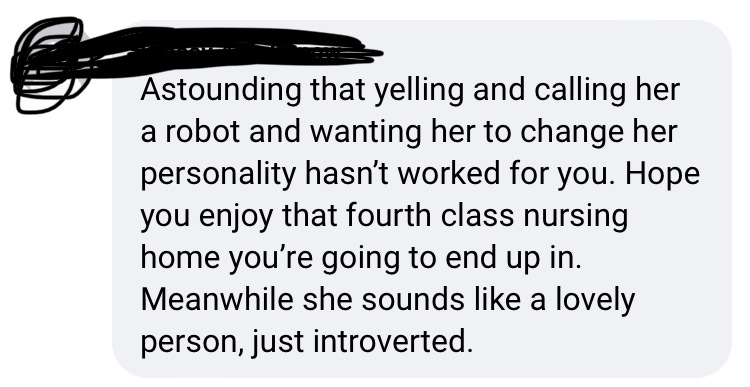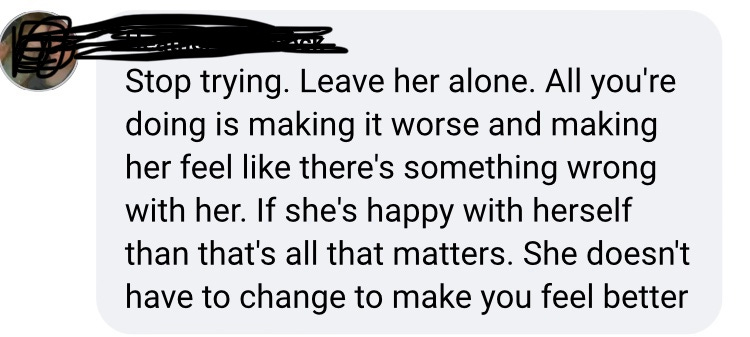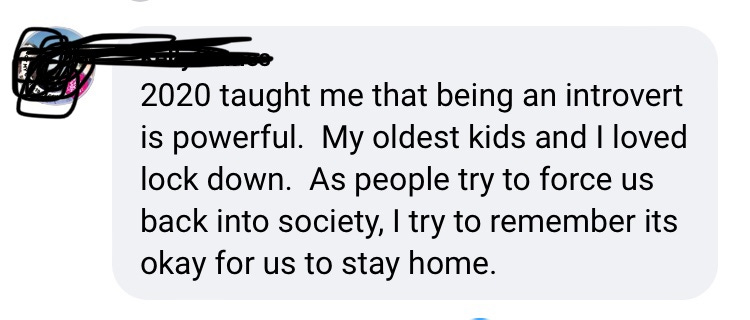When Personality & Love Diverge, Choose Love
For those times when "just be yourself" is bad advice.
I’ve come to the general conclusion that most personality tests out there (apart from perhaps The Big 5) tend to foster both superiority complexes and excuses for bad behavior. Ostensibly, they’re intended to be a tool to help one understand one’s self, strengthen good qualities and overcome weaknesses. But most people don’t use them that way. I know this because I had to deliberately pull myself away from the brink of this personality type morass a few years ago.
Not unlike most adolescents I felt quite out of place, unable to fit in, and weird compared to others my age. (I failed to comprehend that literally everyone else in my age group felt the same way and could have done away with all the self-pitying introspection and the heaping dose of self-satisfactory and addictive “behold I am special amongst all of these mere popular and average people because I am unique and weird.” But that’s why you have to grow up and get on with things. When it comes right down to it, nobody’s really that special.)
I have always been introverted in the extreme. I’m one hundred percent fine all alone with no one to talk to. I secretly look forward to days where I have the house entirely to myself and don’t have to talk to anyone for any reason. It fills my soul with delight. I may even “lose” my phone for a while…
I was also very shy in my youth which is not the same thing as being introverted. I am no longer shy, but the introversion remains.
Introversion, in case you’ve missed the incessant self-aggrandizing proclamations of introverts on the web, is simply this: Interactions with other people, especially in large social gatherings, drain an introvert’s energy. Extroverts are the opposite. Extroverts are energized by interactions with other people, especially in large social gatherings. This does not mean that introverts do not like people. On the contrary, I love people. But after a long day of interacting with people, I want to recharge in solitude if possible.
This has always been the case for me and always will be. I am not shy in the least. In fact, certain members of my family will send me to wait staff at restaurants to ask questions for them, because I have no difficulty, whatsoever, approaching a complete stranger. My people skills are spectacular. I can carry a conversation, make people feel at ease around me, and according to my husband, I’m also quite funny. But…people still wear me out. This is because when I’m with people, I’m fully on. I’m hearing everything, catching fleeting expressions on faces, taking in gestures, hyper aware of how people are feeling, and have a rudimentary knowledge of what they’re even thinking based on all the other information I'm quite subconsciously picking up with my eyes and ears. I could no more easily stop doing this than I could stop breathing. It’s just my nature.
And so, after about two or three hours of intense interaction with many people (like church), I reach a point where I kind of glaze over and I sometimes feel physically tired if not mentally tired.
While this is all true, and it is something that is neither good nor evil, and I can’t change it, I came to the conclusion several years ago, that I was in great danger of letting my introversion turn into an excuse for dysfunctional and even sinful behaviors.
This all rushed back in a flash a few days ago when I stumbled onto quite a silly click bait advice column on Slate where a woman got “schooled” by the online world for her “terrible parenting.” Her great crime? Trying to change her daughter’s introverted behavior.
Sounds terrible, doesn’t it? Shouldn’t we just let our kids be who they are? Shouldn’t we all just be authentically who we are?
Well, maybe. What if you’re a jerk, though? What if you can’t function socially? Should you stay that way?
“Introverts aren’t jerks or dysfunctional!” you say. “They’re wonderfully sensitive, caring, misunderstood people living in a world built for extroverts who are oppressing them. All they want is to stay inside four walls all day talking to nobody, and only venturing out for food which they grunt and beckon for.”
Anyway, allow me to elaborate on this mother’s quandry by quoting the mother directly and linking to the article below.
I Want My Teen Daughter to Stop Being Such an Introverted Robot Person
This may seem like a low-stakes question, but I am truly concerned. My 15-year-old daughter is an extreme introvert, and strongly dislikes big groups of people and large events. She finds it difficult to make conversation and is seemingly uncomfortable even with talking with some of her classmates, even those she has known for years. I am extremely worried about her and how this will impact her in the future. Ever since she was little, she has been very serious, and I would consider her relatively unapproachable. It takes her many years to get fully comfortable with a person, and to start opening up to them. Once you get to know her, however, she has a host of wonderful personality traits. I have had numerous talks with her about getting out of her comfort zone. I’ve tried everything, from yelling at her to reasoning with her, but nothing seems to work. All I want is for her to show that she is a human, and not a machine. For some reason, me saying this seems to bother her, because (as she told me) she does not think of herself as a robot who is devoid of emotion, and she’s sick of people like me saying that she is. It’s difficult for me to see her in any other way, however, because she rarely expresses strong opinions with me or her father, and often shuts down and refuses to let us know what she thinks during some conversations.
Mom continues further about her daughter’s ability to open up and be conversational about topics she’s interested in, but I’ll stop here. You can read the whole thing at the link above. Our wise advice-giver, Nicole Chung, responds with all the nuance one would expect from the modern advice column author—with sarcasm, in fact:
Wow, I’m amazed that yelling at your child, calling her a machine, and telling her she needs to become an entirely different person hasn’t worked out the way you’d hoped!
She continues on in this vein shaming Mom for her person and existence and finishes it all up with something along the lines of, “Your kid is fine. You’re the one who needs to change here. And you should love her just the way she is instead of trying to change her.”
Granted, there’s a lot of information missing in this whole exchange. Things like:
What are the family dynamics in this house?
Does the mother make it a habit to yell at her daughter?
Has the mother tried to take a firm and quiet approach to communicating her expectations of the daughter’s behavior, or is she always excessively emotional?
If I were the one approached for advice, those are the questions I’d be asking and a few more. I wouldn’t be jumping all over the mom’s case. This is because I was once the stonewalling teenager using my silence as a method of control…and it was pretty bratty of me to do so. I was the one disappearing for hours at a time, lost in my own little introverted world while life went on without me, and friends and family wondered if I cared about them at all. I hardly ever talked to them unless I had emotional needs, and you had to beg me for a hug, because I did not like touching people. (There is no deep-seated trauma behind that. I just didn’t like physical touch that much.)
Honestly, I felt for both mother and daughter. Neither needed to be yelled at or jumped on. And probably both of them needed to move in each other’s direction. Both needed to grow.
But the internet didn’t think so. Here are some screenshots of comments I read which rather disturbed me.

And my personal favorite:
Oh, boy.
So, here’s where this all comes together in my head. I’m a Christian. As a Christian, the overarching purpose of my entire life is to bring glory to God. How do I do that? By obeying God’s commands. Jesus said that the greatest commandment, and the commandment that every other commandment traces back to is this, “Thou shalt love the Lord thy God with all thy heart, and with all thy soul, and with all thy mind. This is the first and great commandment. And the second is like unto it, ‘Thou shalt love thy neighbor as thyself.’”
As a child of God, I must be ever more willing to love the people God places in my life in the ways they need me to love them, not just the ways I want to love them. This means that when my inner introvert has come up against an opportunity to love someone, I must choose love over what my introverted soul would rather do at the moment. Full stop. No excuses.
This means I must engage in chit chat on occasion. (I hate chit chat. But some people need chit chat so they can warm up to you.) This means I must stay and talk to a hurting soul when I’d rather retreat to the silence of my room. This means that when the homeless man comes up to me in downtown Atlanta and starts talking my ear off (yes, this really happened) I should not brush him off, but patiently get to what he really needs but is a little too afraid to ask for—food. He just wanted some food.
I’m saying that though being introverted is not sinful, using it to avoid people who need you is. You don’t have to bare your soul to complete strangers. You don’t have to be the life of the party. You don’t even have to be verbose. You just have to listen to the talkative old lady in the checkout line at the grocery store, look her in the eye, and have a friendly smile on your face so she knows you’re glad she exists. You have to get out of the self-absorbed world of your own happy/unhappy la la land and look outwards so you can relate to people who are different than you and who need an encounter with you, very much.
There’s another facet to all of this, as well. Parents are supposed to be guiding and teaching and preparing their children for a functional, adult life. In many ways, they can’t just let their children be who they are or their children will fall over backward at the first stiff breeze of reality. If my parents had simply let me “be myself” I’d still be socially awkward, unapproachable, and I’d pretty much never smile.
But they worked hard on me. When guests came over for dinner, I was not allowed to slink off to my room and wait until everyone had gone to come back out. I wasn’t even allowed to pull out a book, sneak off to a corner of the room, and read it while guests were present. They said it was rude to do that. And you know what? They were right.
They set expectations ahead of time for my behavior when people came over. I had to greet them at the door with the rest of the family, smile, make eye contact, and complete some sort of polite greeting. I had to answer when spoken to with a clear voice and good enunciation. My mom had me practice offering to take coats and hang them up. I was often sent to ask what guests would like to drink and then get it for them.
In short, they taught me to stop focusing on myself and be kind to other people by displaying good manners. Was it hard and awkward? Yes. Did I feel nervous and uncomfortable? Yup. Did it drain my energy? Of course. But I’m so glad they insisted upon it. Instead of being a 38-year-old self-absorbed bore as I could have ended up, my people skills are quite excellent.
It was only in my twenties when I discovered the introvert/extrovert thing and the Myers-Briggs personality tests and all that. It hit me like a thunderclap, and seemed to help explain many of my quirks. I read up on my personality type. I was…(drumroll) an INFJ the rarest of all the types. Oh, my! What an ego boost that was. I was so rare and unique and special!
Reading all about introversion and INFJs was fun for a while. But…little things started turning me off. The way INFJs spoke about themselves in sort of messianic tones was a little weird and off-putting. And rather than recognizing the pitfalls of the type and working to correct them, they seemed a bit proud of the pitfalls. They like to identify with the tortured soul who has such a loud mind that nobody understands them. They know things that nobody else knows. Oh, and don’t ever try to lie to an INFJ because they’ll know! It all started to sound a bit arrogant without realizing how arrogant it sounded which is ridiculous and embarrassing. I began to recognize a bit of that pride and arrogance in myself, and I didn’t like it too much.
So, rather quietly and in my own introverted way, I had a good, hearty laugh at myself and got on with loving God and loving people.
And all of that to say…when choosing between your personality on one side and loving a fellow soul the way God asks us to on the other—choose love all day long and twice on Sundays. This will do two things: 1. You will have fewer regrets. 2. You will become more yourself than ever before because you will have agreed with God who made you. And that means you will be just the person He intended you to be all along, not that boring person you thought you were.
Don’t “just be yourself.” Be like Jesus. It’s much better.
Housekeeping
I would be ever so grateful if you, dear readers, would tell your friends and family about my writing and ask them to subscribe. Use the share button below to do so or even forward my emails to friends and recommend that they subscribe that way. I’ve hit a bit of a wall with new subscribers, and I’d like to reach more people with my writing and news of my novels. Please? Pretty please? With a cherry?
As usual, the next chapter of The Pursuit of Elizabeth Millhouse will be in paid subscribers email inboxes on Wednesday at 7:00 AM. Please consider updating from free to paid so I can continue to raise funds to republish and market the novel.
That’s all for now, folks! Until next time…





